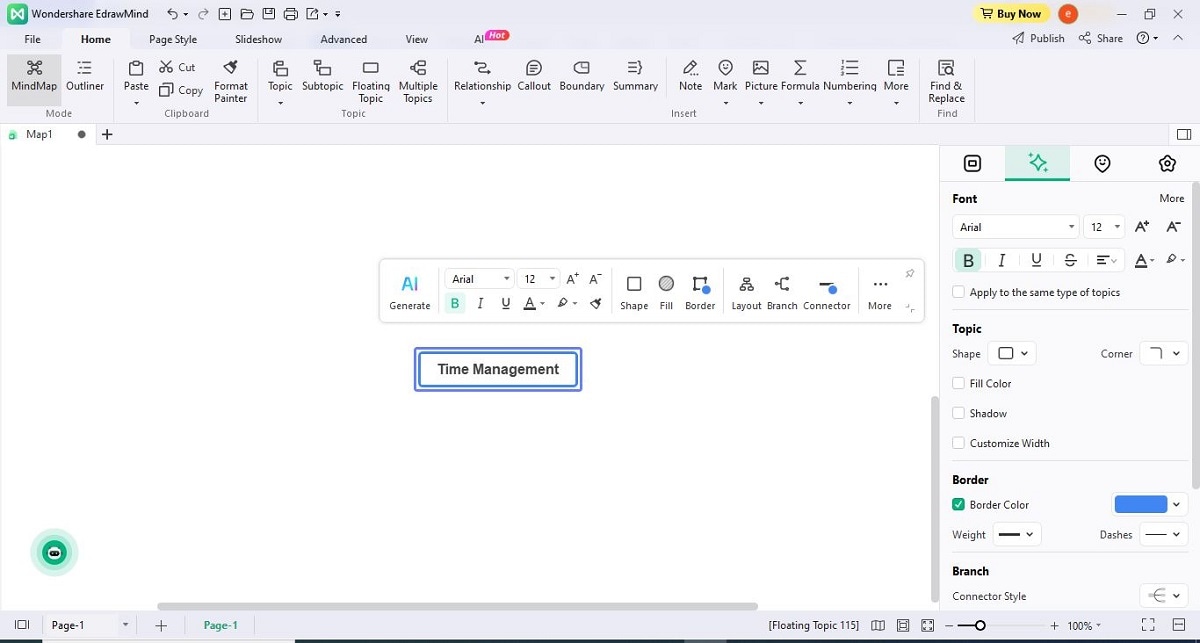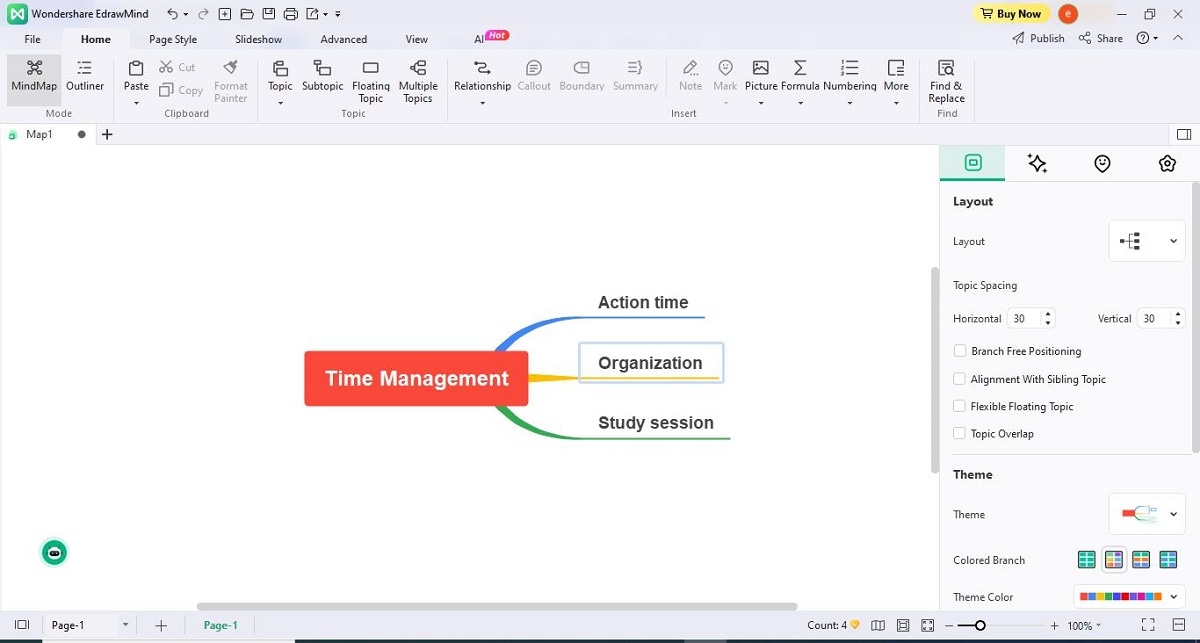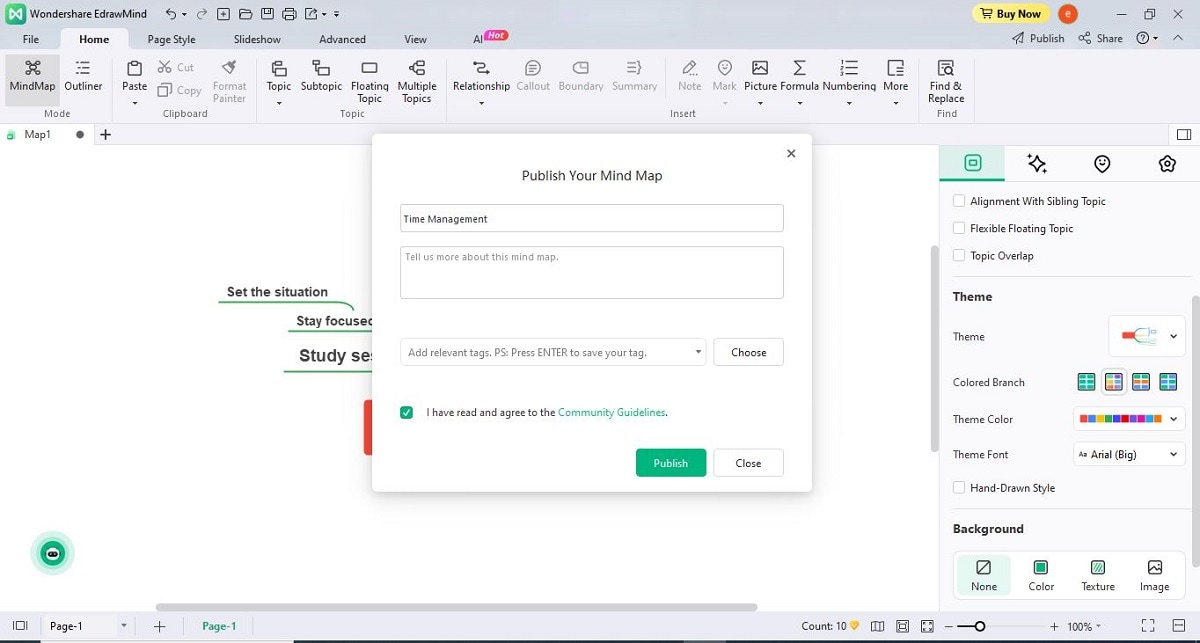
Brainstorming is a powerful technique that fuels creativity and generates innovative ideas. To enhance the brainstorming process, many individuals and teams have turned to mind mapping - a dynamic tool that combines visualized thinking with structured organization.
In this article, we will explore the art of mind mapping brainstorming, unlocking the potential to make the most of your creativity and streamline your idea generation process. By leveraging visual representation tools, mind mapping offers a holistic approach to brainstorming. Join us as we delve into meaning, techniques, and benefits of using mind maps to revolutionize your brainstorming sessions.
In this article
What is Mind Mapping
Mind mapping is a visual way to organize and develop ideas around a single theme in a visible way. It is different from taking regular notes because it uses radiant thinking.
Moreover, mind mapping helps you use more of your brain's power by stimulating both your brain's logical and artistic parts. In this way, it lets you reach ideas, links, and memories deep in your mind and bring them to the surface.
This technique can help you come up with better ideas when you're brainstorming. In short, mind mapping is a simple method anyone can use to solve any problem. You only need a piece of paper and a pen or a digital tool like EdrawMind to make your thought maps.
🚀Other Brainstorming Techniques: 14 Effective Brainstorming Techniques That Work
Benefits of Brainstorming
Now that you understand mind mapping brainstorming, you may wonder how it can enhance your creative problem-solving talents. The following are some advantages of using brainstorming to develop new ideas:
1. Visualization stimulates creativity
Imagining things helps you come up with unique ideas. Using pictures, bright colors, and cool symbols, you can make your mind map more fun and easier to remember. Using visualization can greatly enhance your thinking and boost your creativity. Studies have discovered that visual thinking can encourage creativity by increasing neural linking.
2. Radiant structure sparks new associations
The flow of a mind map is like a framework from the hub out from the center and back again. This encourages you to think critically and provides a new perspective on your thoughts.
3. Helps break down broad ideas into components
When dealing with a complicated subject, it's easy for the mind to get overloaded with possibilities. With brainstorming, you may break down a large topic into more digestible chunks and show the relative importance of each subtopic.
4. Allows flexible thinking and re-organization
One of the most significant advantages of brainstorming is its inherent flexibility. You can add, remove, reorganize, or modify the visual diagram at any moment. This allows for the testing of hypotheses about coherence, as well as the restructuring of concepts.
5. Focuses thought while allowing freedom
Mind mapping can help you find an equilibrium between structure and freedom in your brainstorming sessions. It not only keeps your thoughts organized and cohesive, but it also helps you zero in on the most crucial aspects of your project.
Additionally, it allows you to communicate your ideas freely and openly without the confines of traditional writing. You'll improve the depth and breadth of your thinking this way.
How to Brainstorm with a Mind Map
As we all know that brainstorming can generate a bulk of ideas. Mind mapping provides a road map to your creative ideas, just like organizing a messy room.
If you are facing a problem use the technique of mind mapping. Or if you are a businessman and run with a shortage of time. You can try some tools for mind mapping. EdrawMind is a free-to-download mind-mapping software that you can use for your mind-mapping brainstorming.
Let us take an example of using mind mapping techniques. Here are some simple steps to guide you through the process of mind mapping brainstorming with the EdrawMind tool:
Step 1Define your central topic or question
Central topic is the main part that you are brainstorming. Enter your main keyword. Define a topic for your mind map suppose we take an example of time management.

Step 2Brainstorm subtopics or keywords
Write down any related words, ideas, concepts, or questions that come to mind regarding your main issue. Link them with lines. In the example below, we added action time, organization, study session, and control as subtopics.

Step 3Expand on each subtopic or keyword
For each branch, think of more specific or detailed ideas relevant to it. Write them down as sub-branches, and draw lines connecting them to the main components. Expand the branches by clicking the 'Plus' icon on your secondary keyword.

Step 4Review and Publish/Share your Mind Map
Look at your mind map for gaps, errors, and unnecessary repetition. You may rearrange the components of your mind map as you see appropriate. Use a variety of tools and formats and then hit the Share/Publish button as shown here:

Mind Map Brainstorm Template
To further understand how mind mapping might improve your brainstorming, let's look at a sample mind map created for a specific project.
Template 1: Mind Mapping Brainstorming
Let's say you're in the market for a new way to impress your client, and you want to brainstorm some ideas. All you need is to dissect the issue, pick out its nits and pins, and determine what you need to know about it. State your objectives, make a game plan or central node for the objective, and draw branches.
You'll feel that actions, theories, and strategies are sprouting up like mushrooms.Think it over, and make some changes. Sort things out, get rid of duplicates, and polish them up.
This part is the answer to your problem. The finished mind map neatly outlines potential answers for creative approaches.
Template 2: Mind Mapping Idea Generation
Idea generation is important for the brainstorming process. The generation of novel concepts with the potential to address a challenge is known as idea development. Paper and a pen, or an electronic program will also come in handy when creating your mind map.
Allow your mind to wander freely and uninhibitedly. When you consider your central idea, write down any related words, phrases, ideas, or thoughts that come to mind. Convergence process examine the connections, overlaps, and patterns in your head map. Any component of your mind map can be modified in any way you like. EdrawMind's artificial intelligence-powered brainstorming tool can help you generate numerous variations on your central concept.
Conclusion
In conclusion, incorporating mind mapping into your brainstorming sessions can greatly enhance your creative thinking and idea generation. The visual nature of mind maps facilitates better organization, collaboration, and exploration of concepts. The steps are also
To fully embrace the power of mind mapping, consider utilizing a comprehensive tool like EdrawMind. Mind map makers empower individuals and teams to create visually stunning and highly effective mind maps. Download one today and unlock your full brainstorming potential.





 below.
below.  below.
below. 
